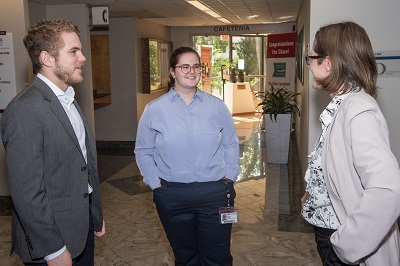
Something that Feels Right
June 19, 2023
Hello, my name is Eleanor Helm! I’m a rising junior at the University of Delaware, studying Biological Sciences with a concentration in cellular and molecular biology and genetics, and minoring in Spanish Studies. Like many college students, I changed my major to end up where I am now. And, as I’ve learned from this change, even if it seems easier to stick with your old familiar plans, some of the best things in life happen when you choose to try something new. That’s why when I heard about the fellowship with the Fox Chase Cancer Center, I knew I had to try and be a part of the program. Even if I had never done research before and didn’t feel completely prepared, the time had come again to go down a new path.
So, I began the process of applying for the program, eventually interviewing with Dr. Purdy, Dr. Leystra, and Dr. Rall. After getting off the Zoom call with them, I literally couldn’t knock the smile off my face. These guys were so cool! They were real scientists who did real science stuff every day! It was just unimaginably awesome. Later, when I found out I had been accepted to the program, I felt like the door to the next stage of my life had been opened in front of me. At this point, I already knew that I loved biology, I had been wanting to try out research for a while, and now I would be learning from incredible mentors for an entire summer! As I prepared to begin working at the center, I thought to myself, this feels right.
The first week at Fox Chase went by so fast that I felt like my brain doubled in size every day! I don’t think I ever learned so much new material in so little time, and I was so thankful for all of the other students in the program who helped me understand all those difficult topics. Everyone I met at the center was so kind, intelligent, and down to earth, and it made me realize, once again, what a gift it was to be able to work with them this summer.
Soon after, week two arrived and I got to begin working in Dr. Balachandran’s lab. As I learned from my mentor, Carly DeAntoneo, my lab is focused on a cell death pathway called necroptosis. Necroptosis is an important tool for cancer treatment because it makes cells explode and get inflamed. This inflammation then acts as a warning signal to our immune system which makes it better at recognizing cancer. So, the main focus for our lab was figuring out how to trigger necroptosis. One cause of necroptosis that the lab had identified last year is something called Z-RNA: an unusual left-handed form of RNA that gets produced when a cell is under stress or has been infected by a virus. The Z-RNA then gets sensed by a protein called ZBP1, and this initiates necroptosis. My goal for the summer is to figure out what other proteins are involved in this pathway in order to see how exactly it can be harnessed to mount an immune response against tumors.
That all seemed super complicated, but Carly helped walk me through it all and taught me some of the basic techniques important in the lab, as well. We worked through several protocols like how to split a cell culture, how to do a BCA assay, how to run a Western Blot, and how immunofluorescence staining works. It was all so cool, and it just felt insane that I could be handling these incredible instruments and be a part of something so cutting-edge. I can’t wait to see what else I’ll be able to experience this summer!
Lab Essentials: Problem-Solving, Hope, and Asking Questions
July 9, 2023
Now that I have spent a few weeks in the lab, I’ve gotten a clearer picture of how research works on a day-to-day basis. All the experiments going on around me are like pieces of a big puzzle that everyone in the lab is working on with each scientist focusing on a different aspect of how the necroptotic pathway works. One of my favorite times in the lab is when I can overhear them collaborating and sharing their results. Just the other day, one of the postdocs in the lab was discussing how the first clinical trial of the lab’s new drug went. She told us that the patient’s tumor had stopped growing since being treated with the drug, and hopefully with enough time, their immune system could get an upper hand over the cancer. At that moment, it really struck me how this research truly had the potential to improve people’s lives, and I was right there to see it happen!
When I heard the news about the clinical trial, it also made me think back to a quote I read earlier that week while I was researching the history of the Fox Chase Cancer Center: "The ethics of human concerns are indivisibly bound with scientific observations; human values and science cannot be separated." This quote is from the Nobel Prize-winning researcher from Fox Chase who invented the first hepatitis B vaccine, Baruch S. Blumberg, and his words really made an impact on me. Similar to Dr. Blumberg’s message, our lab has not only been able to illuminate the wonder of the world by using scientific observations, but it has also been able to help lessen human suffering and improve the human condition. That is a pretty amazing thing to be a part of.
 That being said, not everything is as exciting and dramatic as all that. Most of the time, research involves testing one small, tedious thing and waiting for results. Now that I have run four western blots that all failed to provide results, I appreciate how work-intensive every step is in the scientific process. I’ve also learned that the problem-solving required for adjusting an experiment until it works is one of the most important skills to have in the lab. For instance, when the western blot didn’t work the first time, we changed the concentration of acrylamide in the gel to get a better separation of the proteins. When that didn’t work, we tried staining the membrane with Ponceau red dye to see if the protein actually transferred over to the membrane in the first place. Then we experimented with using different ECL substrates, none of which worked either. Finally, we received new antibodies for the protein we were trying to blot, so hopefully the fifth time we attempt the western blot, the protein will show up. Even though this seems like a lot of failures, I haven’t let these setbacks get me down; staying hopeful and determined seems to be yet another important skill in research. Besides, this chance to learn how to troubleshoot is just as valuable as getting results
That being said, not everything is as exciting and dramatic as all that. Most of the time, research involves testing one small, tedious thing and waiting for results. Now that I have run four western blots that all failed to provide results, I appreciate how work-intensive every step is in the scientific process. I’ve also learned that the problem-solving required for adjusting an experiment until it works is one of the most important skills to have in the lab. For instance, when the western blot didn’t work the first time, we changed the concentration of acrylamide in the gel to get a better separation of the proteins. When that didn’t work, we tried staining the membrane with Ponceau red dye to see if the protein actually transferred over to the membrane in the first place. Then we experimented with using different ECL substrates, none of which worked either. Finally, we received new antibodies for the protein we were trying to blot, so hopefully the fifth time we attempt the western blot, the protein will show up. Even though this seems like a lot of failures, I haven’t let these setbacks get me down; staying hopeful and determined seems to be yet another important skill in research. Besides, this chance to learn how to troubleshoot is just as valuable as getting results
However, I unfortunately had another issue with a different experiment, this one intended to synchronize the cell cycles of my cells. The goal was to treat the cells with nocodazole in order to arrest the cells in between the G2 and M phases. The issue was that I was supposed to add DMSO (a solvent) to the control cells since that was what the nocodazole was dissolved in. But instead, I mistakenly added plain DMEM (the growth media), making the control essentially useless. I only realized my mistake later that night when I sat straight up in bed and realized that DMSO and DMEM are actually not the same thing and–crazy enough–there was a reason I needed to add DMSO instead! What this experience taught me is that when you are trying something for the first time, you might not even know enough to know that you don’t know. The only solution is to ask as many questions as possible and make sure that you know the reasons behind every step of a process. I’m glad that my mentor and the other people in my lab remember how it was to be new to research and are happy to share their knowledge with me. For the remaining weeks in the program, I look forward to asking plenty more questions, and if I’m lucky maybe I’ll get some answers too.
Final Thoughts
August 25, 2023
I’m now sitting in my house as I write this final blog post, finally taking some time to look back at all of the incredible experiences I had this summer. It has been a week since our final presentations and I can’t believe how fast the final month of the program flew by. It’s truly strange to think that I won’t be walking into the lab next Monday, continuing my experiments, running Westerns, and splitting my cells. I’m embarrassed to say that I even got a little emotional when I threw my cells out at the end of the program–I’m going to miss those little specks under a microscope…
In all seriousness, though, I have never had a more engaging and fascinating summer than this one, and this experience at Fox Chase has driven me to seek out even more opportunities to get involved with research, especially when I return to the UD campus in the spring. The pride I felt after presenting my final project was greater than any other experience I’ve had in my academic career thus far, and I can’t imagine quitting research after all of this. It was so cool to be able to share my research with my peers and other scientists, especially when I consider how I wouldn’t have even understood my own project a few months earlier. I learned so much, and I can absolutely see myself doing research for the rest of my life thanks to the experiences I gained this summer.
Even though I was super proud of the work I put in this summer, I was a bit worried about how my final presentation would turn out, especially as the program was coming to an end. The focus of my project changed near the end of the summer, and it took some work to wrap my head around how to explain my research from a new angle. Originally, we were focused on how Z-RNA/DNA was involved in the necroptotic pathway, and we were initially going to use immunofluorescence imaging to look for a change in Z-NA levels when we knocked down other proteins. However, due to time constraints and issues with our experiment, we changed our goal to merely look for a change in levels of cell death when we knocked down these proteins. I wish that we had been able to investigate the Z-NA levels further, but it was still very interesting to get the experience of doing siRNA knockdowns in the first place, as well as doing a cell viability assay to show cell death levels. We didn’t end up getting any positive results, but even finding out that knocking down the protein Caspase 8 doesn’t increase necroptosis levels was one of the coolest things I’ve ever done, so I’m happy!
 Looking back on this summer, I can’t believe that I was only in the lab for a little over two months. The extent to which the horizons of my life have widened in this short amount of time has been incredible. It is a rare experience to see yourself changing as it’s happening, but the chance to learn so much and try so much in so little time has given me that opportunity. I saw myself becoming more confident, more purposeful, more hopeful for my future career, more knowledgeable in biology, and more open to new experiences. Now I can see myself in the light of all I have accomplished, and I can’t imagine not having been a part of this program. I hope everyone I met this summer knows how fortunate I’ve felt to get to know them. Thank you, Empower Fellowship. This has been amazing!
Looking back on this summer, I can’t believe that I was only in the lab for a little over two months. The extent to which the horizons of my life have widened in this short amount of time has been incredible. It is a rare experience to see yourself changing as it’s happening, but the chance to learn so much and try so much in so little time has given me that opportunity. I saw myself becoming more confident, more purposeful, more hopeful for my future career, more knowledgeable in biology, and more open to new experiences. Now I can see myself in the light of all I have accomplished, and I can’t imagine not having been a part of this program. I hope everyone I met this summer knows how fortunate I’ve felt to get to know them. Thank you, Empower Fellowship. This has been amazing!